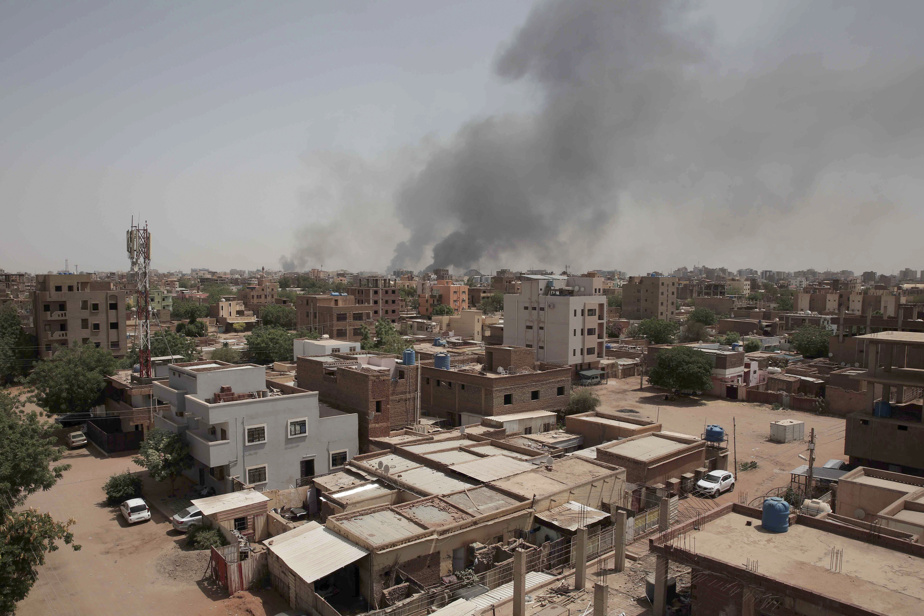(Khartoum) Clashes between the army and paramilitaries in Sudan have left at least 97 dead and many injured, the Union of Doctors reported on Monday morning.
“The civilian death toll in the clashes since their outbreak on Saturday…has reached 97 people,” the organization said in a statement, noting that this number does not include all the dead, many people able to get to the hospital due to travel difficulties.
While the wounded number in the hundreds since the fighting began on Saturday, according to doctors, the World Health Organization (WHO) announces that “several of the nine hospitals in Khartoum which receive wounded civilians have no more blood, transfusion equipment, intravenous fluids and other vital materials”.
In the capital, where in some neighborhoods electricity and running water have been cut since Saturday, patients – sometimes children – and their relatives “have no more food or drink”, warns a network of pro- democracy. Impossible, they add, to send treated patients safely, but this creates “a bottleneck that prevents everyone from being taken care of”.
And the three-hour “humanitarian corridors” announced in the afternoon by the two belligerents did not seem to change the situation: during all this time, the sounds of explosions and gunfire did not stop in Khartoum.
Fighting with heavy weapons is still raging in the night between the regular army led by General Abdel Fattah al-Burhane and the Rapid Support Forces (FSR), former militiamen from the Darfur war who have become auxiliaries to the army before trying to dislodge it from power since Saturday.
Air raids shake buildings, while artillery fire and street fighting with automatic rifles or heavy machine guns shake Khartoum and Darfur, in the West.
A network of pro-democracy doctors had earlier counted 56 civilians as well as “dozens” of fighters killed, and more than 600 people injured.
The World Food Program (WFP) has suspended aid after three of its staff were killed in Darfur, when more than a third of Sudan’s 45 million people needed humanitarian assistance before the recent outbreak of violence.
In Khartoum, bathed in the smell of gunpowder, residents barricaded themselves in their homes for another long and anxiety-provoking night as columns of thick black smoke continue to rise from the city center where political and military institutions sit.
“It’s very worrying, it looks like it won’t calm down soon,” said Ahmed Seif, who lives with his wife and three children in eastern Khartoum.
He fears his building has been hit by gunfire, but says he is “afraid to go out and check” for fear of stray bullets and men in fatigues roaming the streets.
Witnesses also reported artillery fire in Kassala, in the east.
The conflict had been simmering for weeks, preventing any political settlement in one of the world’s poorest countries. Since the popular uprising that overthrew Omar al-Bashir in 2019, Sudan has been trying to hold its first free elections after 30 years of dictatorship.
During the putsch that ended the democratic transition in October 2021, General Burhane and General Daglo, known as “Hemedti”, had joined forces to oust civilians from power.
But their rivalry exploded on Saturday.
The international community has since multiplied calls for a ceasefire. The Arab League and the African Union met urgently.
In Cairo, Arab countries agreed to condemn the violence and call for a “political solution” – an option that has so far failed to lead to Sudan’s return to democratic transition, only emerging in 2019 from thirty years of Islamic-military dictatorship.
The African Union, for its part, announced that it would dispatch the president of its Commission, Moussa Faki Mahamat, to the scene and that the latter would go “immediately” to Sudan “to commit the parties to a ceasefire”. . The airport is closed as well as several borders, in particular with Chad.
From the United Arab Emirates, former civilian Prime Minister Abdallah Hamdok, arrested by General Burhane during the October 2021 putsch, called for “preventing any foreign interference”.
It was impossible on Sunday to know which force controlled what. The FSR announced that they had taken the airport on Saturday, but the army denied it.
The FSR also said to hold the presidential palace. The army has denied and above all claims to hold the HQ of its staff, one of the main power complexes in Khartoum.
As for the television, the two parties also claim to have taken it. In the surroundings, residents report continuous fighting while on the air, only patriotic songs are broadcast, as during the putsch.
Because the open war between the generals is also media: on Saturday, Hemedti chained interviews to Gulf television channels, of which several states are his allies, multiplying the insults against General Burhane, who has remained invisible so far.
Hemedti has repeatedly demanded the departure of “Burhane the criminal”, while the army published on Facebook a “wanted notice” against Hemedti, “criminal on the run”.

